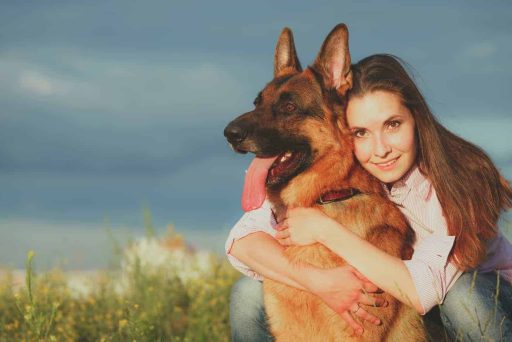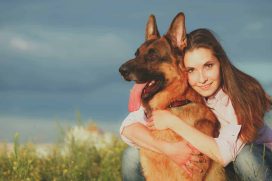The German Shepherd is a large breed dog. They originate in Germany and were bred to herd sheep. Over time the breed has adapted and changed a litte, but today the German Shepherd is mostly seen as a police and military dog, though they can still herd sheep. German Shepherds are loyal, steady, intelligent, and should be confident.
Do German Shepherds bond with one person? German Shepherds are considered a “one person” breed and generally bond with one person in the family. Even if they live in a family with many people they will have one person that they love best and are most dedicated too.
A German Shepherd will bond with the other people of the household, similar to other dogs bonding to one person, but not to the same degree that they are bonded with “their human.” This can be an issue in some cases where the German Shephard may try to protect “their person” from other family members.
Being a German Shepherd’s favorite person can be quite flattering. They will respond to your commands over that of other people. They will try to stay with you as much as possible. Plus, they will devote themselves to you. You get the feeling that they would die for you without a second thought.
Why Do German Shepherds Pick One Person?
German Shepherds usually bond closest to the person who provides them with the most care. That is the person who feeds them, walks them, brushes them, and spends the most time with them. In many ways, it makes sense that this would be their favorite person.
How do German Shepherds show affection and loyalty to the person that he bonds with? Will he ignore all others? Will he never leave your side? Will he always obey you the instant you ask him to do something?

Well, if you are the one that your German Shepherd is bonded too, then he will typically be more attentive to you. You German shepherd may go for a walk with or listen to someone else in your household, but if you are there too, your German Shepherd will want to walk closer to you and listen to you more than the other person.
Another example would be a training situation. Perhaps someone in your household is doing training tricks with your German Shepherd for fun. You are not aware of this and call the dog to you. If you are the German Shepherd’s person, he will stop mid-trick and come to you, even if the other person has treats.
German Shepherd Bonding – Male vs Female
The difference between male and female German Shepherds is pretty small. However, in general, female German Shepherds may be a little bit more willing to extend her bond and love to include more people. Meanwhile, males tend to be very oriented to one person. However, this is not always the case.
So, if you have a family and want your German Shepherd to bond closer to many family members vs just you, a female might be a better option. A female is usually more protective of all the people in the household and not just one person. Females are often more accepting of strangers as well. Though the breed as a whole is aloof with strangers.
Dangers of German Shepherd bonding to one person
German Shepherds bond with one person. If that person is you then it can feel quite flattering and even makes you feel like you have bragging rights. However, there can be a downside to this. A Germans Shepherd may try to protect you from other family members or friends. Something as simple as a hug from your mom or your toddler could make your German Shepherd try to jump in to “save the day.”
A German Shepherd may also try to protect you from other animals. This could be other pets in the household or the pet of a visiting friend. This can be a dangerous situation as well. Especially if you have a small dog or pet that likes to paw at you or otherwise be close to you.
It doesn’t take much imagination to realize that this could be a very bad situation. I mean you love your German Shepherd but it’s nice to be able to be close to other people and animals. If the dog is protecting you then your best bet is to remove yourself from the equation.
If you go to hug your spouse and your German Sheperd charges in to protect you from them. Simply walk away and hide behind a closed door. After your dog realizes you have gone he will likely back down. He needn’t protect you if you aren’t there. After a few minutes call him to you, have him do a few tricks and then offer a treat. This shows the dog that you love him, you just don’t like his possessiveness of you.
Work on this as often as possible and in as many different settings and with as many different people as possible. This will help him to generalize that you don’t want him to protect you from everything. It will also help him to learn the difference between mutual desire for being close and unwanted attention.
If you don’t have time to work on the training than avoid having your dog in situations that he might try to protect you. This protecting or possessiveness of you is a muscle and the more it gets to work the stronger it will become. For instance, you’re hosting a party with lots of people. You may not want to spend the entire time doing training with your dog because you are busy preparing food, answering the door, chatting, etc. What will you do with your protective German Shepherd?
Give him a good walk or exercise session before the guests arrive. Put him in a quiet room with a stuffed Kong or bone and let him rest there during the party. If you want to do training with him at some point during the party you can, but be willing to take him back to the quiet room if you need too. This is a great way to protect your guests and your dog.
The last thing you want to do is scare your guests to death (especially kids) so be sure to let people know if you intend to use them in your training. Ask them if it is okay. Even people who like dogs might not be up for the challenge of having a German Shepherd lunging, barking, and snarling at them.
If the German Shepherds protectiveness feels like more then you can deal with on your own, seek the help of an expert. Private training classes in your home or at a training facility can be of great help! Be sure the trainer uses positive methods that do not harm the dog in any way. The last thing you want is a dog that is in protect mode to feel pain.
How Can I Get My German Shepherd To Bond With Other People Too?
Dividing up the duties of your German Shepherds care is a great way to help your dog bond more strongly with others in your home. Rotate who feeds the dog, who trains the dog, who walks the dog, who brushes the dog, who plays with the dog, etc. This will help to make all the household members more valuable and bonded to the dog.
It might be a good idea to keep track of these things on a whiteboard. Write down each meal, walk, etc. for the day with approximate times. Then when it is completed by someone in the household they can put their initials by the task they completed. This will help to prevent confusion as to whether the dog has been fed yet or not.
Another way to build your dog’s bond with all members of the household is just to have multiple people involved with each task. Feed the dog together, walk the dog together, do training sessions together, play games together with the dog. A great training game is hide-and-seek with your dog. Everyone hides and then people take turns calling the dog, when the dog finds them he gets praise and a treat. It’s fun for the whole family!
It’s a good idea to make a list of your Germans Shepherd’s favorite things. Have this list posted on the fridge. When someone in the households has some extra time then they can pick an item and enjoy that activity with the dog. This will help the dog to build a stronger bond with all people in the household, because everyone knows what the dog loves, not just “their person.”
Can Socialization Help German Shepherd Bonding?
Socialization is important training for all dogs. This is especially true for the German Shepherd. Normally we think of socialization as introducing a dog to all kinds of people, dogs, and animals. This is an important part of socialization but it’s not the whole story.
There is another part of socialization that is often overlooked but is super important especially for breeds like the German Shepherd. You need to get your German Shepherd used to all sorts of situations. Like people coming over and greeting you and your family, even giving hugs and kisses. Arguments where no one is really in danger, but there might be raised voices and door slamming. You cuddling on the couch with your significant other. The kids being scolded or put in time out.
You can even fake an argument. Use it as a training tool. Direct your pup to do what you want him to do if you get into a real argument. Of course, make use that the pup knows you are not mad at him. As with all socialization make sure your pup has a positive association with all the scenarios.
The more your German Shepherd can experience these things as a puppy the better. He will know better how to handle all of these scenarios as he grows up. It will help him to know when he should and should not intervene. You will need to be vigilant and keep the socialization as positive as possible.
Summary – do German Shepherds bond with only one person
German Shepherds will bond to some degree to everyone in their household. However, the person how is their main caretaker will be THE one they bond with most. This is usually not a problem, though in some instances it can be a bad situation.
In some instances, a German Shepherd will try to guard his person from other people and animals including those within the household. This can be particularly bad if the dog tries to protect a parent from a child or tries to keep spouses away from one another.
You can increase the bond that a German shepherd has with everyone in the household. Have everyone be involved in the care of the dog. Do group games and training sessions with your dog. Go for walks together. When you combine these techniques with good socialization this is your best opportunity for a well rounded and well behaved German Shepherd Dog.





